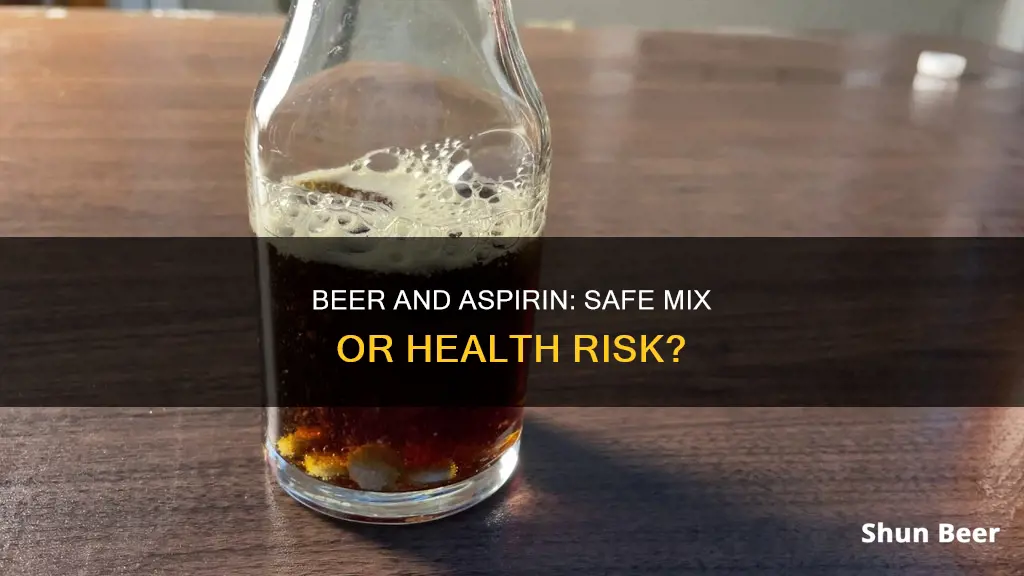
Mixing beer and aspirin is not recommended, as it can lead to potentially harmful interactions. Both beer and aspirin have blood-thinning properties, which can affect the blood's ability to clot and increase the risk of bleeding, especially in the gastrointestinal tract and stomach. This can lead to gastrointestinal distress, including nausea and vomiting, and can cause or worsen ulcers, heartburn, or stomach upset. The combination can also increase the risk of liver damage and chronic liver disease. Additionally, alcohol can irritate the stomach lining and increase the production of stomach acid, further contributing to stomach irritation and potentially leading to stomach ulcers or bleeding.
| Characteristics | Values |
|---|---|
| Can you drink beer after taking aspirin? | The NHS states that you can drink alcohol while taking low-dose aspirin. However, drinking too much alcohol while taking aspirin can irritate your stomach and cause gastrointestinal distress, including nausea and vomiting. |
| Aspirin side effects | Aspirin can cause gastrointestinal bleeding, nausea, vomiting, heartburn, stomach upset, dizziness, and an increased risk of liver damage. |
| Alcohol side effects | Alcohol can cause drowsiness, impaired coordination, and gastrointestinal issues. |
| Aspirin and alcohol combined side effects | The combination of aspirin and alcohol can increase the risk of stomach bleeding and liver damage, and exacerbate the side effects of both substances. |
| Recommendations | It is recommended to consult with a healthcare provider before consuming alcohol while taking aspirin. Moderation and responsible use are key, and it is generally advised to wait at least 2-3 hours after taking aspirin before consuming alcohol. |
What You'll Learn

Mixing aspirin and alcohol increases the risk of gastrointestinal bleeding
Mixing aspirin and alcohol can have adverse health effects. While aspirin is a common over-the-counter drug that people use to treat aches and pains, drinking alcohol while taking aspirin can increase the risk of gastrointestinal bleeding.
Aspirin is a non-steroidal anti-inflammatory drug (NSAID) and a blood thinner that slows the blood's clotting action by making platelets less sticky. This means that when you take aspirin, it is less likely that blood clots will form in your body. However, when you mix alcohol with aspirin, the risk of gastrointestinal bleeding increases. This is because alcohol increases blood pressure, which can lead to prolonged gastrointestinal bleeding. The more alcohol you consume, the higher the risk of bleeding becomes.
Gastrointestinal bleeding can be life-threatening if not treated promptly. It can cause dangerous blood loss and anemia over time. Symptoms of gastrointestinal bleeding include dark-red or black, tarry stools, or bright-red blood in vomit. However, it is not always easy to see, and in some cases, there may be no symptoms at all. Therefore, it is essential to seek medical attention if you experience any of these symptoms or if you have taken more than the recommended dose of aspirin while drinking alcohol.
To minimize the risk of gastrointestinal bleeding, it is recommended to limit alcohol consumption when taking aspirin. The Food and Drug Administration (FDA) advises that healthy women of all ages and men over 65 years old should not have more than one drink per day while taking aspirin. For men younger than 65, the recommendation is no more than two drinks per day. Additionally, spacing out aspirin and alcohol consumption as much as possible during the day can help reduce the risk.
In summary, mixing aspirin and alcohol can increase the risk of gastrointestinal bleeding due to the blood-thinning effects of aspirin and the increase in blood pressure caused by alcohol. It is crucial to follow the recommended guidelines for alcohol consumption while taking aspirin and to be vigilant for any signs of gastrointestinal bleeding to ensure prompt treatment and reduce the risk of life-threatening complications.
Beer and Gum Grafts: What You Need to Know
You may want to see also

The combination can cause nausea and vomiting
Combining aspirin and alcohol can have several adverse effects on the body, and it is not advised. One of the most common side effects of this combination is nausea and vomiting. This is due to the irritating effect that both substances have on the stomach lining.
Aspirin, also known as acetylsalicylic acid, is a non-steroidal anti-inflammatory drug (NSAID) that is commonly used to relieve pain, reduce inflammation, and lower fever. It is available over the counter and is often used for headaches, muscle aches, and arthritis. Alcohol, on the other hand, is a central nervous system depressant that can cause drowsiness, impaired coordination, and gastrointestinal issues.
When combined, aspirin and alcohol can increase the risk of stomach irritation and nausea. This is because both substances can irritate the stomach lining and increase stomach acid production. The combination of these effects can lead to a higher chance of nausea and vomiting. Additionally, the increased stomach acid production can also contribute to heartburn, another common side effect of mixing aspirin and alcohol.
The risk of nausea and vomiting from mixing aspirin and alcohol is higher in individuals who regularly consume large amounts of alcohol or have a history of stomach ulcers or gastrointestinal issues. It is important to note that these side effects can be uncomfortable and debilitating, and they may be a sign of more serious underlying issues such as gastrointestinal bleeding or liver damage.
To reduce the risk of nausea and vomiting, it is recommended to avoid mixing aspirin and alcohol. If you are taking aspirin, it is generally advised to limit your alcohol consumption or consult your healthcare provider for personalized advice based on your health condition, medications, and lifestyle factors. Understanding the potential risks and interactions between aspirin and alcohol is crucial for making informed decisions about your health and well-being.
The Beer Bug Mystery: How Does It Work?
You may want to see also

It can worsen ulcers, heartburn, or stomach upset
Drinking beer after taking aspirin is not recommended, as it can worsen ulcers, heartburn, or stomach upset. Alcohol consumption can irritate and erode the stomach lining, which may eventually lead to ulceration. This erosion can cause open sores in the stomach lining, known as stomach ulcers. Although some people with stomach ulcers may not experience any symptoms, alcohol can worsen symptoms such as abdominal pain, nausea, and a feeling of fullness.
Alcohol can increase the amount of acid in the stomach, irritating the stomach lining and causing gastritis, or inflammation of the stomach lining. This irritation can lead to pain, sickness, and a constant ache in the stomach, which may get better or worse after eating. Gastritis can also be a long-lasting condition, and if left untreated, it can lead to serious problems such as anemia, peptic ulcers, gastric polyps, and stomach tumors.
The combination of aspirin and alcohol can further increase the risk of gastrointestinal distress, including nausea and vomiting. It can also increase the risk of gastrointestinal bleeding, which can be life-threatening if not treated promptly. Therefore, it is important to limit alcohol consumption while taking aspirin to avoid these potential side effects and health risks.
Mixing Beer and Xanax: What's the Danger?
You may want to see also

The risk of liver damage is increased
Mixing aspirin and alcohol can have adverse effects on the liver. Both substances independently put stress on the liver, and when combined, they can cause substantial liver damage. Prolonged use of this combination can lead to permanent liver damage, resulting in serious health complications and even death.
The liver is responsible for flushing out toxins from the body. When we consume alcohol and aspirin together, the liver has to work harder to remove the additional toxins. This overuse of the liver can lead to damage and possible liver disease if the issue persists over time.
Some common signs of liver damage include significant fatigue and exhaustion, unexplained weight loss and loss of appetite, nausea and vomiting, and pain in the upper right side of the abdomen. It is important to seek medical attention if you experience any of these symptoms.
While aspirin is generally considered safe, mixing it with alcohol, especially for those with an alcohol use disorder, can have dangerous consequences. It is crucial to understand the risks associated with combining these substances. Abstaining from alcohol is the most effective approach to reducing the progression of liver damage and disease.
Working for Beer Distributors: What You Need to Know
You may want to see also

The side effects of aspirin may be exacerbated
While aspirin is a common over-the-counter drug that most people consider safe, mixing it with alcohol can lead to adverse side effects. Both substances have individual side effects, but when combined, these side effects can become more pronounced and severe. Here's a detailed look at how the side effects of aspirin may be exacerbated when mixed with alcohol:
Increased Risk of Gastrointestinal Issues
One of the most significant risks of mixing aspirin and alcohol is the potential for gastrointestinal distress, including nausea, vomiting, heartburn, and stomach upset. This combination can also cause or worsen ulcers and increase the risk of gastrointestinal bleeding, which can be life-threatening if not treated promptly. According to studies, heavy alcohol consumption further elevates this risk.
Impact on Liver Function
Aspirin and alcohol are both metabolized by the liver, and their simultaneous presence increases the workload on this organ. This additional strain can affect the liver's ability to function optimally and may lead to liver damage over time, potentially increasing the risk of liver disease.
Intensified Side Effects
Aspirin and alcohol each have their own set of side effects, and when combined, these effects can be intensified. Common side effects of aspirin include stomach irritation, heartburn, and dizziness. Alcohol, on the other hand, can cause drowsiness, impaired coordination, and gastrointestinal issues. Together, these substances can make these side effects more severe and uncomfortable.
Increased Toxicity
The liver plays a crucial role in regulating chemical levels in the blood and removing toxins. When it has to process drugs like aspirin and alcohol, the liver experiences increased stress, leading to higher toxicity levels. This increased toxicity causes alcohol to enter the bloodstream faster, resulting in impairment occurring more quickly.
Additional Risks
The combination of aspirin and alcohol can lead to several other risks, including problems operating a vehicle due to higher blood alcohol content, increased risk of overdose, and breathing difficulties. Additionally, chronic alcohol consumption with aspirin may increase the likelihood of developing life-threatening illnesses, such as organ failure, heart problems, and liver damage.
It is important to note that the risks and interactions mentioned above may vary depending on individual factors such as dosage, frequency of consumption, sensitivity, and pre-existing health conditions. Consulting a healthcare professional before mixing aspirin and alcohol is strongly advised to ensure a comprehensive understanding of potential risks and to receive personalized guidance.
Hopsy Beer: How Does the Freshness Work?
You may want to see also
Frequently asked questions
It is not recommended to mix alcohol and aspirin. Both substances have blood-thinning properties, which can increase the risk of bleeding, especially in the gastrointestinal tract and stomach.
Mixing aspirin and alcohol can lead to gastrointestinal distress, including nausea and vomiting. It can also cause or worsen ulcers, heartburn, stomach upset, and liver damage. In addition, alcohol can worsen the side effects of aspirin, affecting a person's overall bodily function.
There is no specific recommendation on how long to wait, but it is generally advised to space out aspirin and alcohol consumption as much as possible. If you plan on drinking in the evening, it is best to take your aspirin in the morning to minimise the effects.







